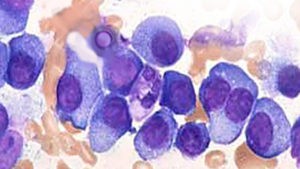
Diagnosed with SMM, SPB, or MGUS?
Learn how you can stall the development of full-blown Multiple Myeloma with evidence-based nutritional and supplementation therapies.
Click the orange button to the right to learn more.
- You are here:
- Home »
- Blog »
- Pre-Myeloma »
- Smoldering Multiple Myeloma- KRD or Non-conventional?
Smoldering Multiple Myeloma- KRD or Non-conventional?

“Cancer treatment can be debilitating, but there may be ways patients can better prepare themselves for the challenges to come…”
Hello David- I believe I was diagnosed with monoclonal gammopathy of undetermined significance (MGUS) at least 2 years ago which progressed, I think, to smoldering multiple myeloma (SMM) on records from my appointment in July 2018. I will meet with my oncologist tomorrow to discuss treatment of kyprolis, revlimid, dexamethasone (KRD) for the 1st time, having been monitored for MGUS and SMM for the past couple of years.
This results from recent PET scan. I experience no symptoms. I’m otherwise healthy on NO medications. I’ll be 74 in April, and will plan to impliment some general aspects of Gerson therapy to compliment therapies in your Pre-MM cancer coaching program.
I’m very motivated to avoid side effects. I’m generally active, and feel fine as a matter of routine. I’m inclined to not start conventional KRD treatment course right away. I’d appreciate any comments you have based on this limited information. Thank you very much. Peter
Hi Peter-
- the risk of side effects that come with chemotherapy (as you seem to be considering),
- the real possibility that chemo will reduce your quality of life (chemo may make you feel awful…)
- the fact that once a person begins active therapy, he/she starts down the road to multi-drug resistance.
- your pre-MM can remain stable and you don’t progress to MM or
- your pre-MM can progress to MM and you will have “prehabilitated” and should respond better to any chemotherapy you choose to undergo. Please see the article about prehabilitation below.
- MM Survivor
- MM Coach
- Director PeopleBeatingCancer
Recommended Reading:
How ‘Prehabilitation’ Can Benefit Cancer Patients
“Cancer treatment can be debilitating, but there may be ways patients can better prepare themselves for the challenges to come…
The benefits of exercise in helping cancer patients deal with fatigue, mood swings, and other issues experienced during and after treatment are well documented…
- Consult with your providers before you start any exercise or other prehab program.
- Walk, walk, walk — an easy aerobic exercise that anybody can do.
- Strengthen your muscles through core training, which may make it easier to recover after surgery or other treatment.
- Make sure you’re eating and sleeping well…”



